Peter Cawdron's Blog, page 2
April 6, 2025
Welcome
 Like all writers, I’d love to see one of my novels brought to life on the screen. In reality, very few novels are ever optioned, let alone made for TV or cinema—and if they are developed, they often fall into production hell, so my expectations are low. Back in 2017, my novel Retrograde was optioned by Miramax just a few months before Harvey Weinstein was exposed as a sexual predator and eventually arrested. Needless to say, the Retrograde option died along with his career.
Like all writers, I’d love to see one of my novels brought to life on the screen. In reality, very few novels are ever optioned, let alone made for TV or cinema—and if they are developed, they often fall into production hell, so my expectations are low. Back in 2017, my novel Retrograde was optioned by Miramax just a few months before Harvey Weinstein was exposed as a sexual predator and eventually arrested. Needless to say, the Retrograde option died along with his career.
My adult daughter, Sarah, is an award-winning screenwriter. She has turned several of my novels into screenplays and has produced mood boards like the one below to show how the visuals would work in practice.

Welcome to the Occupied States of America just won Best Screenplay at a US Film Festival.
There are no directors or producers attached to the project, so it’s not likely to go anywhere, but the film festival enjoyed the story so much that they did a table reading where actors sit around and practice the screenplay. This may very well be the closest I ever get to having something made. It is flattering to be in consideration.
If you’d like to listen to the opening of Welcome to the Occupied States of America, here it is!
If anything is ever made, I’ll be sure to let you know, as it sure would be fun. For now, a table reading will have to do 

April 5, 2025
Why Amazon?
Why are my books published (almost) exclusively on Amazon? It’s a good question. I hope this blog post helps explain my position.
I get a lot of flak for having my books on Amazon. And I get it. Amazon’s employment practices suck. Although Amazon seems like a monopoly with 40% of US online retail sales, it only accounts for 10% of total US retail sales, with Walmart and Target eroding its influence.
For all its faults, Amazon has done extremely well supporting independent publishing. I know they’re not the only ones, but their model has been comprehensive and (importantly) hasn’t changed in over a decade, giving authors like me a lot of confidence in the process in the long term.
Along with the likes of Kobo and Nook, Amazon pioneered the concept of ereaders with their Kindle devices back in the 2000s. And to their credit, they’ve stuck with them when devices like the Sony Reader was discontinued after eight years. With a battery life spanning a month or more and screens that can be read in bright sunshine and ebooks prices being a fraction of paperbacks, ereaders provide readers with a low-cost alternative to regular books. That has caused the book market to flourish. A staggering 99% of my sales are ebooks.

Traditional publishing is enticing but offers no answers.
I have two traditionally published novels with Harper Voyager, meaning I’m an established authors in their stable, and yet I’m often snubbed by them. Questions about publishing other novels go unanswered. And it’s not that my emails aren’t being read. I’ll ask four questions in bullet point form and get three answers, with my question about exploring more publishing opportunities being ignored.
And then there’s the issue of pricing. Like daffodils flowering in spring, I’m perennially asking for the price of my books to be lowered. The ebook has been priced ABOVE the hardback in the US. Here in Australia, the ebook price is an eyewatering $32 dollars—FOR A F%$KING EBOOK!

With draconian pricing like this, nobody makes any money off my traditionally published novels. Not them. Not me. It’s really dumb.
Needless to say, I’m frustrated with traditional publishing and don’t see a future with them.
Let’s be honest here. I’m an obscure author. Reaching new readers is insanely difficult. I have diversified across other platforms, with two of my best novels (Galactic Exploration and Welcome to the Occupied States of America) being available on Google Play, Apple iBooks, Kobo, Nook, etc, but I still sell more of these books on Amazon than all the others combined. To be brutally honest, I earn next to nothing from those other outlets.
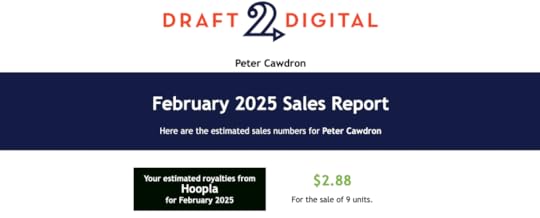
It’s depressing, but I keep those two books on those other platforms so at least some of my books are outside of the Amazon ecosphere.
So why are the rest of my novels exclusive to Amazon? Ah, this is the crux of the issue.
Amazon has a program called Kindle Unlimited. It’s Spotify-for-books. Basically, readers pay a single amount each year, and then they can read anything in the Kindle Unlimited library at no additional cost. They can read as much as they like. That has been a game-changer for me. That’s where I am discovered, as readers can pick up one of my novels on a whim and without worrying about buying a dud. Then they can go on and read all 30 novels in the First Contact series without paying a cent more.
How do I get paid? Per page read. In practice, this works out at about 1/3 of what I would make from an ebook sale, but I get so many page reads that Kindle Unlimited makes up 70% of my income. The only catch is for a book to be in Kindle Unlimited, it must be exclusive to Amazon.
So there you have it… if I go wide across all distributors, I earn peanuts. Traditional publishers ignore me. Amazon’s Kindle Unlimited gives me a lifeline.
It is fair to say that without Kindle Unlimited, I wouldn’t have written a fraction of the books I have as it has provided a revenue stream that keeps me afloat. Book piracy is rampant and my book sales have fallen over the past 18 months even though I’m writing my best work, but Kindle Unlimited allows me to continue as a fulltime author (for now).
I hope that explains why my novels are exclusive to Amazon. TL;DR — without Amazon they wouldn’t exist.
I know there are a whole host of reasons why people might want to boycott Amazon and American companies, and if that’s your decision, I respect that, but please realize there are a lot of small bit-players like me that get caught in the crossfire.

March 18, 2025
The Minotaur
My latest novel, coming out this Friday, is The Minotaur. It’s a tribute to the Polish novel Solaris.

I love writing tribute pieces to classic science fiction from the Golden Age, as often these stories are lost in time. They can be dated in styling, technology and pacing, but they still pack a punch and have had an impact on subsequent writers, even if they don’t realize it.
In 1961, at the height of the Cold War, Stanisław Lem wrote a science fiction classic from behind the Iron Curtain. At that time, Poland was part of the Eastern Bloc, controlled by the Soviet Union. In the West, there was distrust over the oppressive nature of communism. The Soviets were condemned as the enemy of freedom and progress, but they held the ascendancy in space. After launching Sputnik in 1957, the Soviet Union went on to take photographs of the far side of the Moon and launched Yuri Gagarin into orbit in April 1961. Fear was rampant. America was scrambling to catch up.
And then came Solaris.

Although it’s not a political novel, Solaris is a reflection of its time and explores humanity in the context of First Contact. Rather than quelling uncertainty, it toys with the limits of human understanding and suggests there may not be a rational explanation for everything in the universe.
In the novel, Lem strips bare the arrogance of colonization while deftly telling a story of sorrow, guilt and grief. He writes with prescience and compassion, defying the Western stereotypes projected onto Soviet literature. He satirizes the extremes of politics without ever mentioning any one political system. His piercing insights are still applicable today.
…we don’t want to enslave other races, we simply want to bequeath them our values and take over their heritage in exchange. We think of ourselves as the Knights of the Holy Contact. This is another lie. We are only seeking Man. We have no need of other worlds. We need mirrors.
— Solaris: Chapter 6: The Little Apocrypha
Lem’s depiction of an alien world as a single, living entity, constantly adapting and changing, one that’s incomprehensible to humanity, shifted science fiction from its simplistic origins. He challenged the blind rush to endlessly explore the unknown without actually solving social and political problems and used his novel to confront the egotism of human arrogance.
Man has gone out to explore other worlds and other civilizations without having explored his own labyrinth of dark passages and secret chambers and without finding what lies behind doorways that he himself has sealed.
— Solaris: Chapter 10: Conversation
Like all novels of its time, Solaris is dated. The technology is simplistic. The characters are flat. And then, suddenly, they’re not. Suddenly, they’re rich and full of realism and emotion—and you find yourself lost in an alien ocean.
Although I read the novel over Christmas, it’s been over a decade since I watched the George Clooney adaptation. I think I might have to go back and watch it again!

Oh, by the way, in my novel The Minotaur, there’s a passing reference made to a character called Zak Lem from the crew of the Herschel. Zak is a contracted form of the Polish Staszak, which is a diminutive form of Stanisław. In this way, Stanisław Lem makes a quiet cameo in my tribute to Solaris. Also, the rescue ship in this novel is named after Kris Kelvin, the protagonist in Solaris.
I hope you’ll grab a copy of The Minotaur, but more than that, I hope you will be inspired to read Solaris. It deserves its place among the great science fiction novels of the Golden Age and should not be forgotten.
March 13, 2025
Lunar Codex
This isn’t an image from a movie. There are no special effects involved in this shot. It’s the shadow of the FireFly Blue Ghost after it landed on the Moon—and it’s carrying the Lunar Codex.

The Lunar Codex is a set of microfiche nickel discs and radiation-hardened flash drives designed to last anywhere from a hundred thousand to a million years on the surface of the Moon. It’s the brainchild of Dr. Samuel Peralta and includes work from 40,000 artists across 250 countries. The idea is to capture a snapshot of modern writing, poetry, painting, films, etc, beyond the regular Hollywood/big-corporation monoculture. I’m honored to have seven of my short stories on the Moon. All of these stories can be found in my anthology Hello World.
If you watch the video of the Blue Ghost landing with the Lunar Codex onboard, it unfolds with the grace and beauty of a classic black-and-white movie. The last few seconds are utterly spectacular!
Next week, my latest novel, The Minotaur, launches. It’s a tribute to the 1962 classic Solaris. If you’re looking for a wild ride into outer space, grab a copy!

Thank you for supporting independent science fiction. Your support of this novel makes the next one possible.
January 26, 2025
Why do we read fiction?
Why do we read fiction? It’s pretend. None of it is true. All the great stories from Mary Shelley’s Frankenstein to Jane Austin’s Pride and Prejudice, whether it’s H.G. Well’s War of the Worlds or Arthur C. Clarke’s 2001 A Space Odyssey—they’re all made up. None of them are real. So why do they captivate us? Why do works of fiction capture not just our imagination but our hearts and minds?

As a science fiction author, it might surprise you to learn my favorite novel is John Green’s teenage romance The Fault in Our Stars. Is it perfect? No. In fact, I’d argue John wasn’t happy with the ending and did a rushed rewrite that left the story a little muddled. I suspect I have spotted the exact paragraph where the departure began, but still, it is absolutely brilliant. Why? Because it captures the essence of what it means to be human. Because it has piercing insights into what it means to be vulnerable.
We live our lives in solitude. We’re forever alone in a crowd. No one can ever really know us beyond our words and actions. No one can ever know the inner workings of your mind or mine. No one can ever experience life as we do. We’re trapped, unable to escape our own minds, unable to see through another’s eyes. Eight billion of us all share the same strengths and weaknesses. All eight billion of us will ever only know one life. That is… until we read.
In the words of George R. R. Martin, “A reader lives a thousand lives before he dies, while the man who never reads lives only once.”

Okay, but why read fiction?
If we want to live a thousand lives before we die, why not read biographies? Surely, those are actual lives. Why does fiction hold any merit over non-fiction? The answer is fascinating. It’s because even biographies suffer from the tunnel vision of our internal isolation. The biographer has to draw up details about a historic figure that represents their words and actions, not their heart and feelings, not their thinking and reasoning, not their foibles and misgivings. They’re forever watching from without, not from within.
Ah, but what about autobiographies. Surely, they’re better? On the contrary, autobiographies are worse. They’re self-indulgent. I’d argue that Christopher Hitchens was one of the greatest thinkers of the past century, second only to the likes of Oscar Wilde or perhaps T.S. Eliot and Bertrand Russell, but he was the worst person in the world to write about himself. Compared to his classics like The Trial of Henry Kissinger or Missionary Position or God is not Great, his autobiography lacks penetrating insights into his own nature. It’s a stroll through a summer garden resplendent with flowers instead of an arduous trek across the Sahara, fighting bandits along the way. He told us what he wanted us to hear, not what we needed to hear to understand how he developed his firebrand style of critical thinking.
And that leaves us with fiction…
So why does fiction work? All the characters come from one mind. How is that any better? On the surface, it seems as though it is the worst of all options, but fiction frees us from our inhibitions. Fiction is role-playing writ large. Fiction allows us to dabble with thoughts, feelings and emotions that challenge our souls. We live vicariously through the protagonist, and even when it is someone we find repulsive, like Humbolt in Lolita, there is an opportunity to understand the frailty and madness of what it means to be human. In Humbolt, we get to see the way a man distorts his perception of reality, glorifying and justifying his desires. We see his failure to understand the humanity of women and children, and that, in turn, allows us to learn more about ourselves.
Fiction is an exploration of the soul. In my writing, I explore the concept of First Contact with an intelligent extraterrestrial species, speculating on the nature of their development and interests, but I suspect First Contact will tell us more about ourselves than our guests.
T.S. Eliot once wrote, “We shall not cease from exploration. And the end of all our exploring will be to arrive where we started and know the place for the first time.” And I think the same is true of reading. When we pick up a book of fiction, we may soar to exotic planets or swim in the Mediterranean Sea—we may read of barons, robbers, thieves, lovers and villains, but when we close the final page, we come to know ourselves yet again for what feels like the very first time.
If you want to find yourself, you need to lose yourself in a great book.

January 23, 2025
The Danger of Artificial Intelligence
Whether it’s Grok, ChatGPT or Llama by Meta, AI is advancing at a rapid pace, and US President Donald Trump is throwing hundreds of billions of dollars at the technology to ensure America remains the world leader in AI.
The problem is that AI is getting so good that it’s nigh on impossible to spot when it’s wrong—and it is wrong a lot of the time, producing what are called “hallucinations” where it confidently presents fabricated information as though it were fact. Take, for example, this output from ChatGPT 4, where I asked it to provide an overview of my novels.
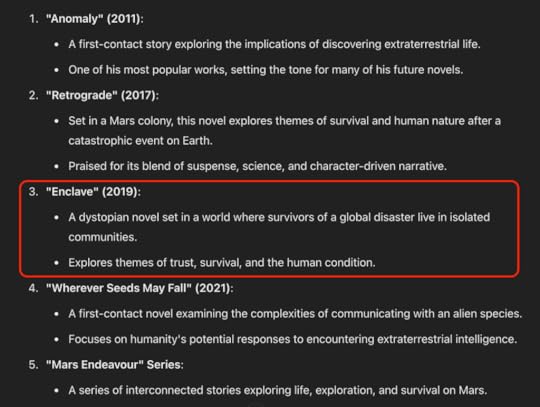
The first thing to note is that it did not list all of my books, which can be easily found on Amazon and Goodreads and in plenty of other places.
The second is that it fabricated a lie. And it did it with the utmost confidence. I haven’t written a novel called Enclave.
And it gets worse… when I started asking it about the novel Enclave, ChatGPT provided me with a five-page summary of the plot, major themes, characters, writing style and how it was received by critics.
And the book simply does not exist. It’s a complete hallucination!
Forget about SkyNet and the Terminator, this is the real danger of AI—it blurs the line between fact and fiction, between reality and fantasy.

In which other field would a 20% failure rate be acceptable?
No one would fly on a plane that crashed every 5th flight. No one would buy pizza from a restaurant where you regularly got food poisoning. AI is not fit for purpose. It shouldn’t be broadly in use and yet it is being rolled out everywhere. Even knowing that there are hallucinations is not good enough, as it’s impossible to tell which 20% is wrong. If a plane crashes, it’s clear to see there is a problem, but ChatGPT gives no clues as to when it is hallucinating. Its confidence in creating illusions is worthy of a magic show on Broadway.
We live in a post-truth world. Misinformation is an astonishing problem in the modern world. We’ve gone from the Information Age in the late 90s to the Misinformation Age, where lies convinced the UK to leave the EU, and the US elected a known felon as President instead of sending him to jail.
And now we have AI spreading random misinformation as though it were true. Fact is being blended with fiction and sold as truth—and that should alarm everyone.
We need to stop calling it Artificial Intelligence. It’s not intelligent. It is a blind aggregator of information with no regard for its veracity. To its credit, Grok provides links to its sources, so there is some hope for the integrity of the information, but this assumes the sources are credible. It would be a significant step forward if other AI platforms adopted a similar strategy. In the meantime, don’t assume AI is correct. That’s a dangerous position to take.
January 10, 2025
Breathe Easy
The pandemic has turned our world upside down. Misinformation has always been a problem in society, but during the pandemic, it became outright lethal. Grifters and conspiracy theorists have muddied the waters, causing people to doubt good science and leading them astray.

It can be challenging to know how to protect yourself and your family, but there are some simple things you can do, like wearing an N95 mask, and yet this can feel intrusive. Beyond that, there have been some astonishing breakthroughs with nasal sprays that have gone unnoticed by the media.

Viraleze has been around for several years, being developed as an antiviral nasal spray BEFORE the pandemic. When applied to COVID, the results were astonishing.
Within 30 seconds to 1 minute of exposure, SPL7013 [viraleze] achieved >99% reduction in infectious virus against Beta and Gamma variants, and >99.9% within 5 minutes, and for Alpha, >99.9% reduction in infectious virus within 30 seconds to 1 minute of exposure vs virus control.
Even once someone is infected, viraleze can reduce infection.
Less than 24 hours after starting dosing, Viraleze
reduced SARS-CoV-2 viral load in the nose by 80%
Now, it’s important to note that Viraleze is not a cure. COVID doesn’t remain in the nose, but Viraleze will reduce the load in one of the major areas where it does reproduce, and that seems to lessen the impact of the overall disease. Also, it is important to note: I’m an author, not a doctor or a scientist. Be sure to read the scientific research on the subject and talk to your doctor about what is best for you.
So why hasn’t this been more broadly adopted? I hate to buy into the “Big Pharma” conspiracies, but some conspiracies are true. For example, for decades, there really was a conspiracy to hide the impact of smoking on lung cancer. Here, it seems like it’s a case of a small company, Starpharma, being pushed out of the market.
Regardless, Viraleze is available in 30 countries. If you’re in the US or Australia, though, you need to purchase it from https://amazon.co.uk and then send it to a free UK postbox before forwarding it on to your personal address. Sounds a little convoluted, but it’s not difficult.
First, sign up for a free virtual postbox in the United KingdomYou’ll need to provide some ID, but it’s pretty straightforward and a UK government initiative so it’s completely legit and above boardThe service is free, meaning there’s no annual cost, but you will be charged £6 for each parcel that arrives at your postbox. If you don’t pay this, it will be thrown out after 30 days. I recommend putting £30 in your UK postbox account to cover (a) the incoming charge and (b) the postage to send the parcel to yourself elsewhere in the world. Look for top up in the top-right corner of the screen.Once you’re signed in, you can find your own unique address under Settings and Address Details.Click on Copy Address for the Parcel Courier at the bottom of the screen. When you order Viraleze from Amazon, this is where you want to send it, as this is your personal UK post box. I get 10-15 bottles at a time as Australia allows for a three-month personal supply, for me and my immediate family. Please note: it is illegal to sell anything you import. It can only be imported for your own personal use in your family. In a couple of days, your package will arrive at your UK post box and can be forwarded on to you. You’ll get an email telling you the package has arrived.
In a couple of days, your package will arrive at your UK post box and can be forwarded on to you. You’ll get an email telling you the package has arrived.
 sign in to the UK postbox and you’ll see there’s a new parcel waiting for you
sign in to the UK postbox and you’ll see there’s a new parcel waiting for you
 Go to the inbox and click on the parcel (so a blue check mark appears) and then click forward
Go to the inbox and click on the parcel (so a blue check mark appears) and then click forward
 Enter your address and use International Parcels – Royal Mail (up to 2kg) and click ForwardThe next screen is a customs declaration form. Use the harmony code 3004900000 for medical supplies
Enter your address and use International Parcels – Royal Mail (up to 2kg) and click ForwardThe next screen is a customs declaration form. Use the harmony code 3004900000 for medical supplies
 Complete the rest of the customs declaration
Complete the rest of the customs declaration
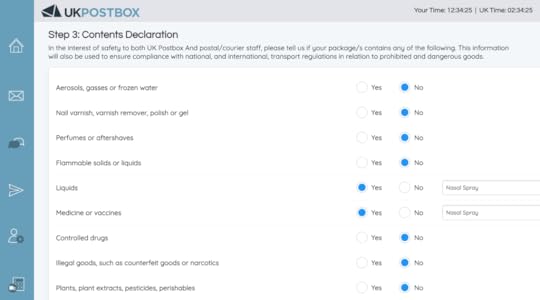
 You’ll need to sign the customs form with your mouse. So long as you have £20-30 in your account, that will be enough to cover the postage. To Australia, it costs £19 in postage. If you don’t have enough money in your account to cover postage the parcel will go into the pending folder and you’ll get sent an email as a reminder to top-up your account. Once it is on its way to you, you’ll still be able to view it under forwarded items. If you want to see a history of everything you’ve sent you’ll find that under sent
You’ll need to sign the customs form with your mouse. So long as you have £20-30 in your account, that will be enough to cover the postage. To Australia, it costs £19 in postage. If you don’t have enough money in your account to cover postage the parcel will go into the pending folder and you’ll get sent an email as a reminder to top-up your account. Once it is on its way to you, you’ll still be able to view it under forwarded items. If you want to see a history of everything you’ve sent you’ll find that under sent

And that’s it. That’s how to purchase something from Amazon in the UK and have it sent anywhere in the world.
Viruses are a bitch.
Whether it’s COVID, RSV, Influenza, Bird Flu or even bacterial infections like Streptococcus, it’s nice to know there are barrier nasal sprays like Viraleze. I’m going to a concert next weekend and I’ll spray before and after the event—and have a great time dancing to Leon Bridges.
January 8, 2025
The Satiated Games
In 2008, Suzanne Collins published The Hunger Games and ignited interest in teen-dystopian literature. I read the first book and watched all the movies—and loved them.
When it comes to writing, be it self-publishing or traditional publishing, it is important to realize that publishing is NOT the Hunger Games.

Far too often, authors act as though they’re in competition with each other. They’re not.
Authors are competing in The Satiated Games.
Publishing books is not a zero-sum game like The Hunger Games. More sales for me doesn’t mean fewer sales for you—and vice versa. Look at the projected growth in ebook sales over the next few years—it’s an expanding market. More and more people are reading ebooks! In the past five years, sales have increased by a staggering two billion dollars!!!

As authors, we need to shift our perspective to understand where our competition actually lies. I’m not worried about other authors grabbing a reader’s attention—I’m competing with Xbox, Playstation, Netflix, Disney+, Candy Crush, Twitter and Facebook.
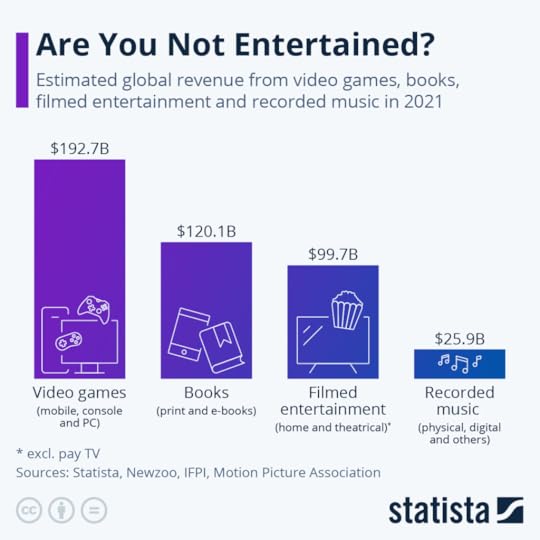
The book market alone accounts for 120 billion dollars. There’s plenty to go around. The real competition comes from gaming and the film industry. Why? Because all three require the most precious and costly resource of all—time. A book’s real cost isn’t in terms of dollars. The five bucks my books cost is paltry. It’s a burger and fries. The actual cost comes in the time it takes someone to read a book. And it’s an opportunity cost. If someone’s reading, they’re not streaming or playing games. So it’s a choice about where they spend their time. The question is, what satisfies people?
Being a person, I think I’m qualified to say people are satisfied with diverse forms of entertainment. It’s not that books, games or streaming services should dominate. All three can provide a balanced, healthy, entertaining mental diet.
Think about the last book you really enjoyed. What did it inspire? What was the impact? I suspect you came away satisfied. Far too often, modern entertainment is predicated on being unsatisfied. Streaming show episodes end on a hook to keep the viewer coming back. The intrigue is often without end (or meaning). Sometimes, the same is true of video games, where the goal is to keep players trapped in that world, selling expansion packs and building online gaming revenue. But a book. A good book satisfies the reader. A great novel leaves them feeling content. And a great book makes someone more likely to go looking for another great read.
January 5, 2025
First Contact
Back in the 1950s, Enrico Fermi asked the question, “Where is everyone?” By “everyone” he meant intelligent extraterrestrials—aliens. But why did he ask this question?
Fermi understood the power of compounding values. He knew humanity was accelerating in its mastery of science and was being inexorably propelled toward the stars. Within that decade, the Soviets launched the first satellite and then the first human into space. In response, the Americans put boots on the Moon barely a decade later.
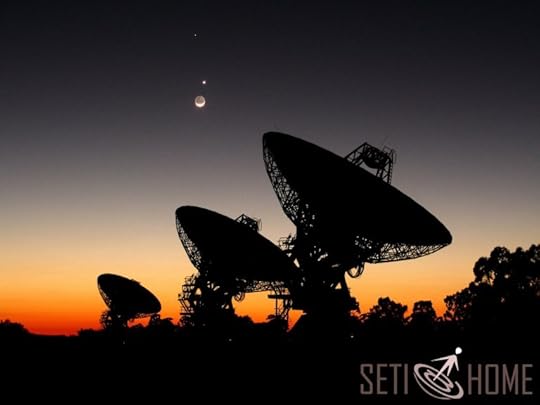
To those alive at the end of the Second World War, it seemed as though the future had arrived all at once. Within the span of a hundred years, humanity had gone from ignorance about microbes and hygiene, ignorance about the origin of species on Earth, ignorance about the size of the universe (we thought there was just one galaxy—ours) and ignorance about physics to banishing polio and mastery of the atom.
Fermi understood the implications of such rapid progress. For a hundred thousand years, humanity had fought for survival as just another animal species. For nigh on ten thousand years, it had struggled with a fledgling sense of culture. From pyramids to the invention of the printing press, each step forward was accompanied with bloody wars. Slowly, the enlightenment dawned. Humans began to think and reason beyond mere selfishness and greed. By the time Fermi posed his question, it was obvious humanity was undergoing exponential growth in terms of scientific accomplishment. Fermi could see where we were heading and wondered why no one else had got there before us.

Fermi looked at the stars and realized a similar intelligent species would have long ago escaped the bounds of their planet. In the same way as Europeans spread to every continent, he reasoned aliens would have found some way to spread throughout the galaxy. In the same way our last hundred years has eclipsed the last hundred thousand, he knew the exponential nature of advancement should have spread intelligent life among the stars.
Seventy years later, NASA and SETI have search vast tracts of space and all we’ve found is silence. As disheartening as this might seem, Fermi’s Paradox is still somewhat premature.
Our ability to examine the stars is in its infancy. NASA scientists are quietly confident the James Webb Space Telescope will allow us to observe life around other stars, but even if it doesn’t, it’s important to understand the context of our search—we’re looking at one tiny corner of just one galaxy out of BILLIONS of other galaxies.
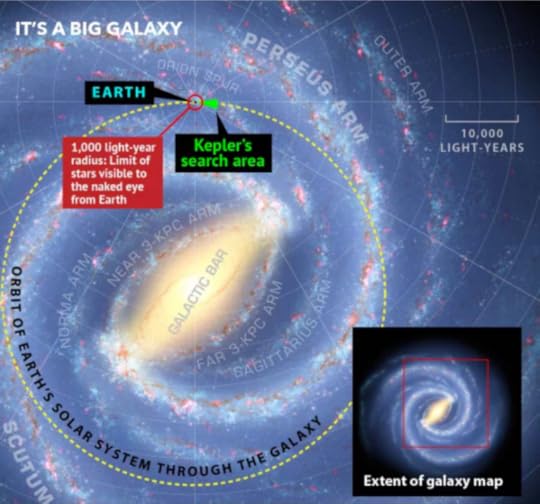
There are an estimated 10^23 or possibly 10^28 stars in the visible universe (that’s not to mention what we can see is only a fraction of what’s out there), but we have little to no capability of examining individual stars in other galaxies. Not finding life in our galaxy could be meaningless. As I write in my novel Galactic Exploration, it may be that our galaxy is akin to the polar regions on Earth—barely habitable. Other galaxies may be more like the African Savannah, teeming with life, and we simply wouldn’t know it as we have no way to see that far with the level of detail required to detect life.
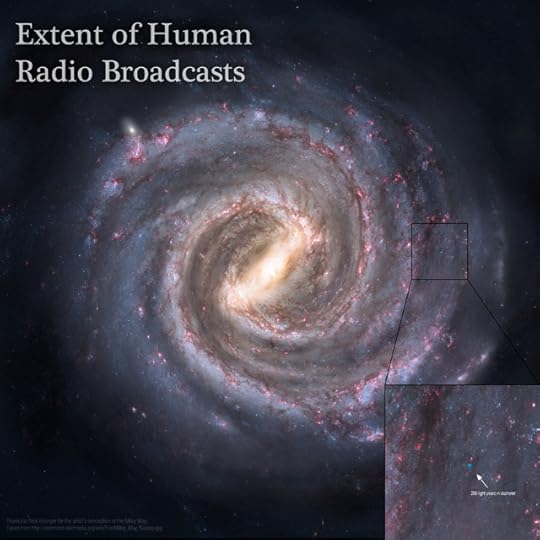 That tiny blue dot marks the outer bounds of human radio waves. Anyone listening for us will be waiting an awfully long time and would require astonishingly sensitive instruments.
That tiny blue dot marks the outer bounds of human radio waves. Anyone listening for us will be waiting an awfully long time and would require astonishingly sensitive instruments.As a science fiction writer, I’ve written almost thirty novels on the concept of First Contact. As much as I’d like to imagine First Contact could unfold with intelligent extraterrestrials, the odds are against it. The safe bet is that the James Webb Space Telescope will find evidence of microbial life in the unbalanced chemical equations in the atmosphere of some distant planet. Certainly, that’s all anyone looking at Earth over the past four billion years would have ever seen.
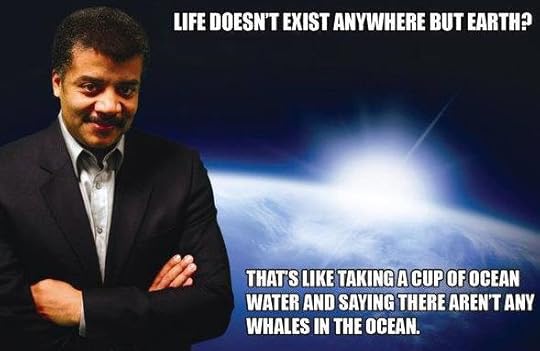
So where are they? They’re undoubtedly out there. Our planet is proof life can and does exist in outer space. If we’ve made it this far, others may have as well. All we can do is keep looking and listening.
About the writer: Peter Cawdron is the author of several First Contact novels including 3ZEKIEL
December 24, 2024
Love, Sex and the Alien Apocalypse
Merry Christmas, Happy Hanukkah, and Grievous Festivus for the rest of us!
Thank you for your kind support of independent science fiction. I consider it an honor and privilege to be able to write the First Contact novels—and it’s avid readers like you that make it possible.
If you’re looking for something to escape the snow (in the northern hemisphere) or the sand (here in the south), check out Love, Sex and the Alien Apocalypse. Although the title sounds a little frivolous, it’s a serious look at First Contact and answers the question: What if we couldn’t fight back? What if an alien invasion was so overwhelming that we never even got a shot off? What if only a handful of people survived and they were hopelessly outgunned? What could make the difference between life and death?
I hope you enjoy this story as much as I did and wish you all the best over the holidays and into 2025
Cheers,




